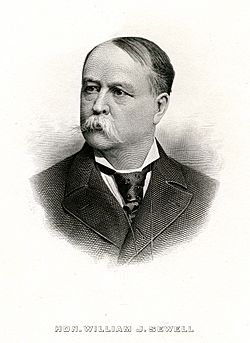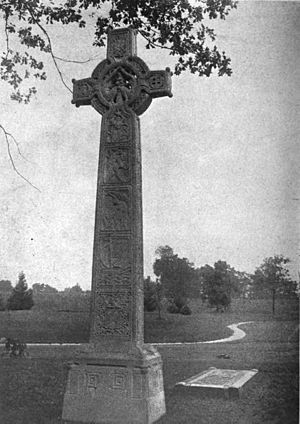William J. Sewell facts for kids
Quick facts for kids
William J. Sewell
|
|
|---|---|
|
Medal of Honor recipient
|
|
| United States Senator from New Jersey |
|
| In office March 4, 1881 – March 3, 1887 |
|
| Preceded by | Theodore F. Randolph |
| Succeeded by | Rufus Blodgett |
| In office March 4, 1895 – December 27, 1901 |
|
| Preceded by | John R. McPherson |
| Succeeded by | John F. Dryden |
| President of the New Jersey Senate | |
| In office 1876 |
|
| Preceded by | John W. Taylor |
| Succeeded by | Leon Abbett |
| In office 1879–1880 |
|
| Preceded by | George C. Ludlow |
| Succeeded by | Garret Hobart |
| Member of the New Jersey Senate from Camden County | |
| In office 1872 – March 4, 1881 |
|
| Preceded by | Edward Bettle |
| Succeeded by | Albert Merritt |
| Personal details | |
| Born | December 6, 1835 Castlebar, County Mayo, Ireland |
| Died | December 27, 1901 (aged 66) Camden, New Jersey, U.S. |
| Resting place | Harleigh Cemetery Camden, New Jersey, U.S. |
| Awards | Medal of Honor |
| Military service | |
| Allegiance | United States Union |
| Branch/service | United States Army Union Army |
| Years of service | 1861–1865 |
| Rank | |
| Commands | 5th New Jersey Volunteer Infantry |
| Battles/wars | American Civil War *Battle of Chancellorsville *Battle of Gettysburg |
William Joyce Sewell (December 6, 1835 – December 27, 1901) was an important American politician and military leader. He was a member of the Republican Party. Sewell served as a U.S. Senator for New Jersey two times. His terms were from 1881 to 1887 and again from 1895 until he passed away in 1901.
William Sewell was born in Castlebar, County Mayo, Ireland. He moved to the United States in 1851 when he was 15 years old. He first worked in business in Chicago, Illinois. Later, he moved to Camden, New Jersey, in 1860. He was married and had four children, two daughters and two sons.
Contents
Military Service in the Civil War
William Sewell was a brave officer in the Union Army during the American Civil War. He started his service as a captain on August 28, 1861. He joined the 5th New Jersey Volunteer Infantry.
Promotions and Key Battles
Sewell quickly rose through the ranks. He became a lieutenant colonel in 1862 and a colonel in 1863. He led a group of soldiers called a brigade at the Battle of Chancellorsville in Virginia. During this battle, he was injured.
Medal of Honor
For his brave actions at Chancellorsville, William Sewell received the Medal of Honor in 1896. This is the highest award for military bravery. He was the only officer leading a New Jersey regiment to receive this honor.
Sewell was seriously wounded again at the Battle of Gettysburg in Pennsylvania. This happened on July 2, 1863, while he was leading his unit. His injuries were so severe that he had to leave the battlefield for a long time. He later returned to service in 1864. He was given command of the 38th New Jersey Volunteer Infantry. However, his wounds eventually made it impossible for him to fight on the front lines. He then commanded Fort Powhatan in Virginia.
Recognition for Service
After the war, President Andrew Johnson honored Sewell. In 1866, he was given the honorary rank of brevet brigadier general. This was for his "gallant and meritorious services" at Chancellorsville. In 1868, he was further honored with the brevet rank of major general for his overall service during the war.
Political Career
After his military service, William Sewell worked in the railroad business in New Jersey. He then began his career in politics.
Serving New Jersey
Sewell was elected to the state senate in 1872. He served there until 1881. He was also the president of the state senate in 1876 and again from 1879 to 1880.
United States Senator
Later, he was elected as a U.S. Senator for New Jersey. He served his first term from 1881 to 1887. During this time, he led several important committees in the Senate. These included committees on military affairs and enrolled bills.
Sewell was a very active member of the Republican Party. He led New Jersey's group at the Republican National Convention five times. He also served as President of the West Jersey & Seashore Rail Road Company until his death.
He was also a national commissioner for New Jersey at the World's Columbian Exposition in Chicago in 1893. He commanded the Second Brigade of the National Guard of New Jersey. He also helped manage the National Home for Disabled Volunteer Soldiers.
After an unsuccessful attempt to be reelected in 1887, 1889, and 1893, he was elected to the U.S. Senate again in 1895. He served this second term until 1901. During this time, he again chaired the Committee on Enrolled Bills.
Later Life and Legacy
William Sewell passed away on December 27, 1901, at the age of 66. He died from heart disease and diabetes at his home in Camden, New Jersey. His Senate seat was then filled by John F. Dryden.
Sewell received full military honors at his funeral. State and federal military groups were present. Official state business in Camden was paused to show respect for his service. He was buried in Harleigh Cemetery in Camden, New Jersey. His grave is marked by a cross designed by the sculptor Alexander Stirling Calder.
In 2005, a special Medal of Honor marker was placed on his grave. He is one of three Civil War Union Brevet Generals buried at Harleigh Cemetery. The community of Sewell, New Jersey, is named after him.
See also
- List of Medal of Honor recipients
- List of American Civil War Medal of Honor recipients: Q–S
- List of United States senators born outside the United States
- List of United States Congress members who died in office (1900–49)
 | Lonnie Johnson |
 | Granville Woods |
 | Lewis Howard Latimer |
 | James West |



